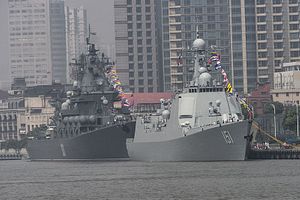This week, Russia and China have begun a naval exercise – dubbed Joint Sea II- in international territorial waters in the Sea of Japan and off the coast of Russia’s Primorsky territory – approximately 250 miles away from Japan. The exercise for the first time includes a joint Sino-Russian amphibious assault drill.
The war games, which are scheduled to conclude on August 28, include 22 vessels, 20 aircraft, 40 armored vehicles and 500 marines, according to RT.
“During the active phase of the maritime maneuvers to last till August 27, the sailors work out the issues of join anti-sabotage, anti-submarine, anti-vessel and anti-aircraft defense. Besides that there’ll be gunnery drills with different types of surface, underwater and aerial targets,” Roman Martov, Russia’s Eastern Military District spokesman, told TASS.
The naval exercise – themed “Joint maritime transportation protection and joint landing missions” – will conclude with an amphibious and airborne landing of Russian and Chinese troops at the Cape Klerk firing range in the southern Primorye Territory. “It’s [the] first time ever such an operation is to be held on the Russian soil,” Martov added. It is also the first time that People’s Liberation Army Navy (PLAN) units are participating in military drills in the Sea of Japan.
As I reported earlier, in May 2015, China and Russia held a much smaller naval drill code-named Joint Sea 2015 that involved nine ships from both countries in the Mediterranean Sea. The navies conducted live-fire drills, underway replenishment and escort operations (see: “China and Russia Conclude Naval Drill in Mediterranean”).
The naval maneuvers “showed that Russian and Chinese seamen can effectively fulfill tasks in such a difficult region as the Mediterranean Sea,” according to the Russian Navy’s Deputy Commander-in-Chief Vice Admiral Aleksandr Fedotenkov.
“Unlike many other war games staged in the Asia-Pacific region, the Joint Sea series focus on emergency response under multiple circumstances, instead of simulating an offensive against a third party,” according to a Xinhua commentary. “As for the far-fetched idea of an emerging China-Russia military alliance, it seems that only the most insensible ones could buy,” the commentary noted.
The naval drill currently taking place aims to bolster equipment interoperability between the two navies, and despite Chinese and Russian claims to the contrary, it is also meant to send a clear political signal to the United States and its allies in the region that Sino-Russian military ties are deepening. Beijing and Moscow have held regular joint naval drills since 2011.

































